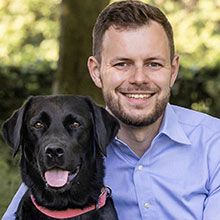Dr Angelo Frei
Lecturer in Inorganic Chemistry
Profile
Biography
Dr Angelo Frei obtained his PhD at the University of Zurich in Switzerland in 2018 working on theranostic metal complexes for the diagnosis and treatment of cancer. He then secured a Swiss National Science Foundation Grant for a postdoctoral stay in the group of Professor Mark Blaskovich at The University of Queensland in Australia from 2018 to 2020.
After that he moved to London for a second postdoc in the group of Prof. Nicholas Long at Imperial College. Since 2022 he has started his independent group in Bern Switzerland as an Ambizione Fellow.
In 2024, he joined the University of York in the United Kingdom as a lecturer. His group is interested in discovering, exploring and understanding metal-based compounds as antimicrobial agents using state-of-the-art techniques such as machine learning and robotics.
Research
Overview
Angelo's research interests include:
- Metal Complexes
- Antibiotics
- Machine Learning
- Automation
- Medicinal Chemistry
Research group(s)
The Frei Lab
In the Frei Lab we are exploring new classes of metal complexes for their antimicrobial potential.
- One focus is the elucidation of the Mode of Action of these compounds. Understanding this will help us design even better metalloantibiotics.
- We are exploring metal-based photosensitizers for a PDT and investigating their potential to avoid resistance in bacteria
- To efficiently explore the vast metal-complex space we are adapting machine-learning based solutions to coordination compounds.
Publications
Selected publications
S. Fulgencio, M. Scaccaglia, A. Frei‡ ”Exploration of Rhenium Bisquinoline Tricarbonyl Complexes for their Antibacterial Properties” ChemBioChem 2024, Cover DOI: 10.1002/cbic.202400435
M. Scaccaglia, M. Birbaumer, G. Pelosi, S. Pienilli, A. Frei‡ ”Discovery of Antibacterial Manganese(I) Tricarbonyl Complexes through Combinatorial Chemistry” Chem. Sci. 2024, DOI: 10.1039/D3SC05326A
M. Orsi*, B. S. Loh*, C. Weng*, W. H. Ang‡, A. Frei‡ ”Using Machine Learning to Predict the Antibacterial Activity of Ruthenium Complexes” Angew. Chem. 2024, DOI: 10.1002/anie.202317901
A. Frei‡, A. D. Verderosa, A. G. Elliott, J. Zuegg, , M. A. T. Blaskovich‡ ”Metals to combat antimicrobial resistance” Nat. Rev. Chem. 2023, DOI: 10.1038/s41570-023-00463-4.
A. Frei‡, A. G. Elliott, A. Kan, H. Dinh, S. Bräse, A. E. Bruce, M. R. Bruce, F. Chen, D. Humaidy, N. Jung, A. P. King, P. G. Lye, H. K. Maliszewska, A. M. Mansour, D. Matiadis, M. P. Muñoz, T.-Y. Pai, S. Pokhrel, P. J. Sadler, M. Sagnou, M. Taylor, J. J. Wilson, D. Woods, J. Zuegg, W. Meyer, A. K. Cain, M. A. Cooper, M. A. T. Blaskovich‡ ”Metal Complexes as Antifungals? – From a Crowd-Sourced Compound Library to First In Vivo Experiments” JACS Au, 2022, Inside Cover DOI: 10.1021/jacsau.2c00308
A. Frei‡, “Metal Complexes, an Untapped Source of Antibiotic Potential?”, Antibiotics, 2020, DOI: 10.3390/antibiotics9020090;
A. Frei‡*, J. Zuegg*, A. G. Eliott, M. Baker, S. Braese, C. Brown, F. Chen, C. Dowson, G. Dujardin, N. Jung, P. A. King, A. M. Mansour, M. Massi, J. Moat, H. A. Mohamed, A. K. Renfrew, P. J. Rutledged, P. J. Sadler, M. H. Todd, C. E. Willans, J. J. Wilson, M. A. Cooper, and M. A. T. Blaskovich‡, “Metal-complexes as a Promising Source for New Antibiotics”. Chem. Sci., 2020, Inside Cover DOI: 10.1039/C9SC06460E

Contact details
https://www.thefreilab.com/
